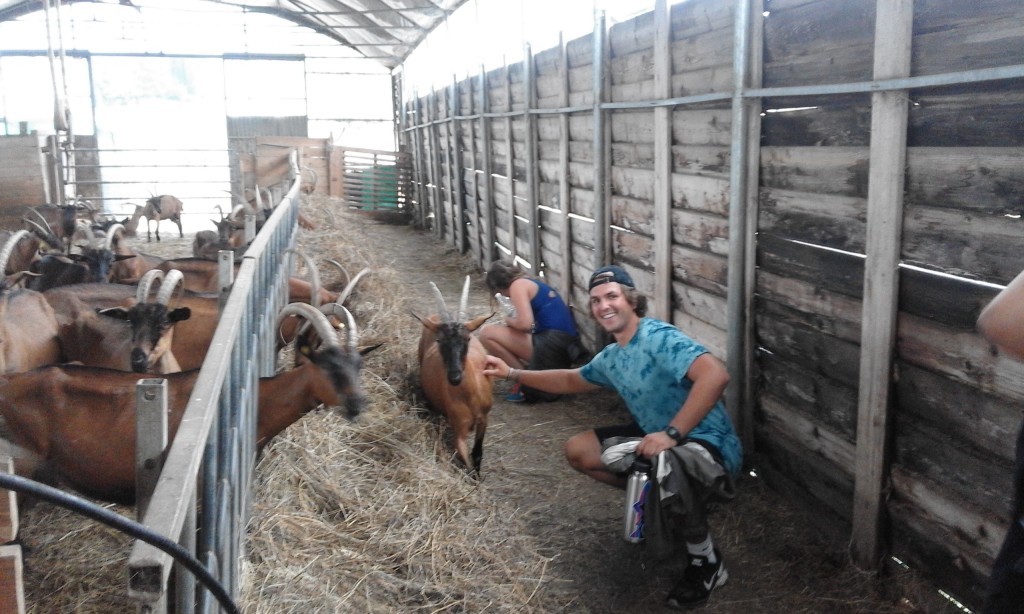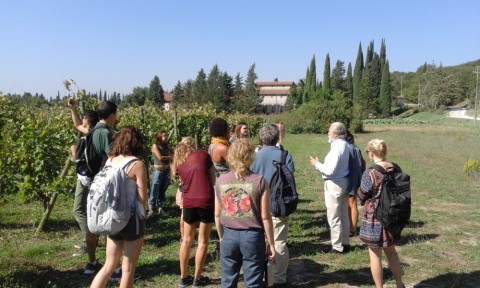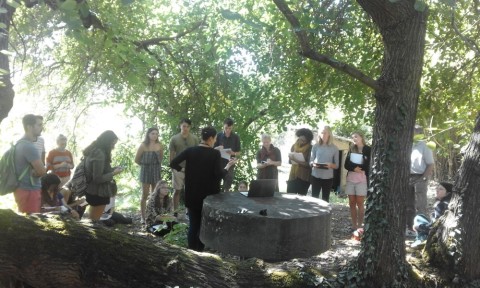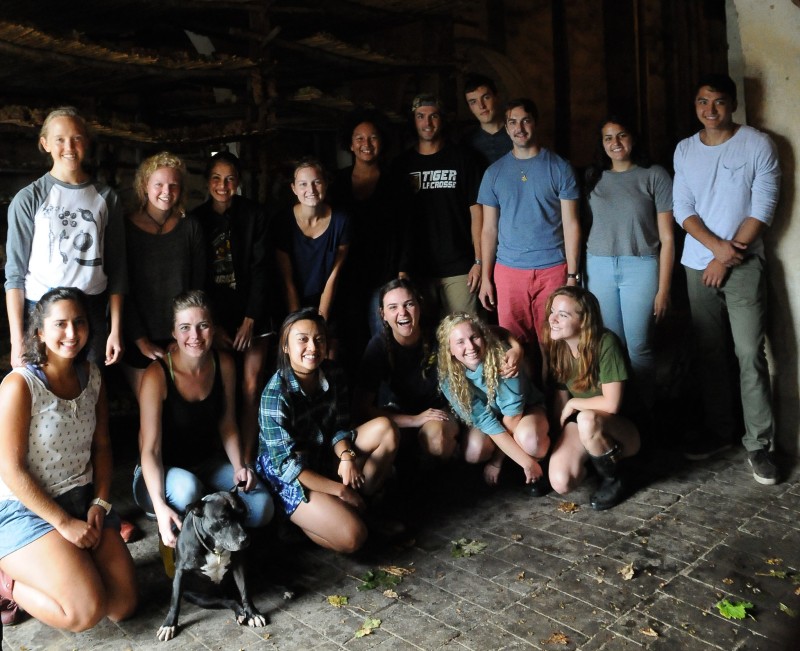Live and study at the intersection of food politics, sustainability, and culture on a working farm in Tuscany.
Italy is the birthplace of the Slow Food movement. Unpack the movement’s motto of “good, clean, and fair food” on the farm and with producers, processors, food activists, and consumers across the region.
Explore how the business of food affects the health and wealth of farmers, workers, families, and communities.
In this new program, students explore how culture and food production intersect in Italy. They learn about Italian and European agricultural movements and initiatives and their political and cultural contexts. They see firsthand how people in Tuscany and Italy are working for sustainability—agricultural, environmental, cultural, and economic.
Students also learn how agriculture and food policy, business practices, and financial structures within Italy and across the European Union affect the health and wealth of farmers, workers, families, and communities.
Logistics
Students live and work at the Castello Sonnino, a historic estate roughly 12 miles outside the major city of Florence. Since the early 1800s, the Sonnino family has run the estate, and the current generation is deeply committed to cultural and architectural preservation. Their vision for sustainable development encompasses the beautifully preserved family residence, as well as 300+ acres of woods, olive groves, vineyards, and working farm land.
Students live in furnished apartments on the Sonnino grounds, and receive a food stipend and cooking lessons. By living at the Castello Sonnino, students enter the landscape and the political and economic context of the farming and food movements particular to Italy.
Explore Castello Sonnino’s web site here to see the housing and the farm. Through an internship placement on the Castello Sonnino farm, in the village of Montespertoli (five minutes’ walk), or at a nearby farm, students gain firsthand experience of sustainable local food systems and the role those systems play in maintaining rural culture in Tuscany. At the beginning of the semester, there is intensive instruction in basic Italian (or other levels for those with previous experience). Finally, students complete a guided independent study project on a topic that deeply interests them.
This program is conducted with the support of institutional partner Università per Stranieri di Siena.
Documentation & Syllabus Examples:
PDF icon Draft syllabus as of January 2016
Prerequisites/Eligibility:
Students must have completed their first year in college
Students must be in good academic standing overall – 2.0 GPA or higher (any GPA lower than 2.5 will receive extra evaluation)
Students must also complete all home campus requirements for off-campus study
There are no course or language prerequisites. Instruction is in English. At the beginning of the program, students will receive intensive instruction in basic Italian language (or at other levels for those with previous study).
This program is conducted with the support of institutional partner Università per Stranieri di Siena.
Courses:
Agriculture and Sustainability in Tuscany
Economics of Sustainable Food Production in Contemporary Europe
Sustainable Italy Internship
Independent Study Project
Total: 4 courses / 16 credit hours
The courses are taken as an integrated whole and provide the equivalent of a semester’s worth of credit, i.e. 4 course credits, 16 semester credits or 27 trimester credits. This program is full-time, five days a week, with classes scheduled for two days a week, and two or three days a week in an internship.
Structured and guided internships give students firsthand experience of sustainable local food systems and the role those systems play in maintaining rural culture in Tuscany. To prepare for the internship, at the beginning of the semester there is intensive instruction in basic Italian (or other levels for those with previous experience).
Internship placements are available at the farmers’ market in the town of Montespertoli (five minutes’ walk), at nearby farms, or in food production/marketing in Florence, 12 miles away. A few internships are available in the enterprises on the Castello Sonnino estate (wine production, honey production, direct sales, and restaurant).
To learn more about the estate, the winery, the various enterprises on the estate, and to see pictures of the student housing (“the winemaker’s apartment”), please visit the web page of Castello Sonnino at http://castellosonnino.it/
Please check back for for information, or email program representative Laureen White to be added to our mailing list.
The program is based in the olive and grape-growing region of Tuscany, and students live and study on a working farm with active cultivation and processing of olives and grapes, and land in farro (spelt, an ancient wheat). There are also chickens and bees on the farm. A five minute walk to the town of Montespertoli gives access to a farmers’ market, which is both a field study site and the site of several internships. Field trips also include visits to other farms in the area, to cheese producers, farmers’ markets, an ice cream producer in Florence, agricultural coops, food processing plants, and grassroots organizations.
Receive Credits That Count
HECUA’s courses provide upper-level credits (junior- and senior- level credits). All students from HECUA consortium institutions receive at the very least “blanket credit,” or sixteen credits toward graduation. Nearly all students also obtain significant major and minor credits for participating in HECUA programs. As is the case with most off-campus study programs, students should work directly with their home institution to receive credit toward a major, or credit toward another graduation requirement. (Other requirements might be “general education” requirements, “liberal education” requirements, or distribution requirements). Experienced HECUA staff are available to assist students in negotiating meaningful credit transfer.
HECUA’s Director of Programs, Sarah Pradt, is always available for more information on credit transfer and for personalized assistance with students’ individual situations.
Major and/or Minor Credits Anticipated
Agronomy
Agricultural education
Agro-ecosystems, agro-ecology
Bachelor of Individualized Study (BIS)
Ecology (ecosystem goods & services, systems analysis, pollution effects)
Economics
Environmental Concentration
Environmental Science
Environmental Science, Policy, and Management
Environmental Studies
Food Systems major at the U of MN
Geography
Global Politics
Global Studies
History
Individually Designed Interdepartmental Major (IDIM)
International Relations
Internship requirement
Italian Studies
Justice and Peace Studies
Nutrition
Political Science
Sociology
Social Justice
Sociology/Anthropology
Sustainability Minor at the U of MN
Sustainability studies: systems theory
Urban Food Systems
Credit approval may be possible in other major or minor areas as well.
How HECUA Students Accomplish Credit Approval
Speak with Study Abroad Office
Provide coursework (syllabus, papers, projects) to Academic Advisor for approval
Speak with Academic Advisor and Office of the Registrar about credit transfer process
Get credits transferred as general credits, fill out paperwork to petition for Major/Minor credit
Meet with the Chair of Major/Minor department
Meet with school’s HECUA board representative about credit approval process
Cat Braza in Italy
Catherine “Cat” Braza is HECUA’s student blogger for the Fall Semester of our Sustainable Food, Agriculture and Justice program. Cat is a junior at Colorado College, in Colorado Springs. She’s majoring in Environmental Science, with a double minor in Music and Studio Art. Read on for Cat’s first impressions of life in Tuscany.
https://www.hecua.org/about/stories/cat-braza-in-italy
https://www.hecua.org/about/stories/cat-braza-in-italy-living-in-season
https://www.hecua.org/about/stories/cat-braza-in-italy-phone-free-in-france
Program Categories: Abroad
Program Location: Castello Sonnino, Montespertoli, Tuscany, Italy
Semester(s) offered: Fall 2016
Program Start/End Dates: September 5, 2016 to December 16, 2016
https://hecua.org/study-abroad/italy/






